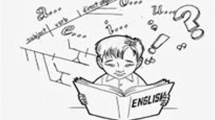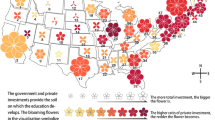Abstract
Since 1990 there have been a series of studies examining the effects of diagrams versus text on computer user’s performance. There have also been studies investigating the effects of metaphors on learning and information searching. Research results indicate that verbal meatphors help learners to develop more complete mental models. However, little is know about the effects of visual metaphors that possess both the features of diagrams and metaphors. In response to the gaps in the metaphor research literature, the present study aims to compare the effects of visual versus verbal metaphors in facilitating novices and experts in the comprehension and construction of mental models.
Preview
Unable to display preview. Download preview PDF.
Similar content being viewed by others
References
Blackwell, A.F.: Pictorial representation and metaphor in visual language design. Journal of Visual Languages and Computing 12, 223–252 (2001)
Borgman, C.L.: The user’s mental model of an information retrieval system: an experiment on a prototype online catalog. International Journal of Human-Computer Studies 51, 435–452 (1999)
Butcher, K.R.: Learning from text with diagrams: promoting mental modeldevelopment and inference generation. Journal of Educational Psychology 98(1), 182–197 (2006)
Fiore, S.M., Cuevas, H.M., Oser, R.L.: A picture is worth a thousand connections: the facilitative effects of diagrams on mental model development and task performance. Computers in Human Behavior 19, 185–199 (2003)
Glenberg, A.M., Langston, W.E.: Comprehension of illustrated text: pictures help to build mental models. Journal of Memory and Language 31, 129–151 (1992)
Hsu, Y.C.: The effects of metaphors on novice and expert learners’ performance and mental-model development. Interacting with Computers 18(4), 770–792 (2006)
McKay, E.: Exploring the effect of graphical metaphors on the performance of learning computer programming concepts in adult learners: a pilot study. Educational Psychology 19(4), 471–487 (1999)
Author information
Authors and Affiliations
Editor information
Rights and permissions
Copyright information
© 2007 Springer-Verlag Berlin Heidelberg
About this paper
Cite this paper
Hsu, Yc. (2007). The Effects of Visual Versus Verbal Metaphors on Novice and Expert Learners’ Performance. In: Jacko, J.A. (eds) Human-Computer Interaction. HCI Applications and Services. HCI 2007. Lecture Notes in Computer Science, vol 4553. Springer, Berlin, Heidelberg. https://doi.org/10.1007/978-3-540-73111-5_30
Download citation
DOI: https://doi.org/10.1007/978-3-540-73111-5_30
Publisher Name: Springer, Berlin, Heidelberg
Print ISBN: 978-3-540-73109-2
Online ISBN: 978-3-540-73111-5
eBook Packages: Computer ScienceComputer Science (R0)




